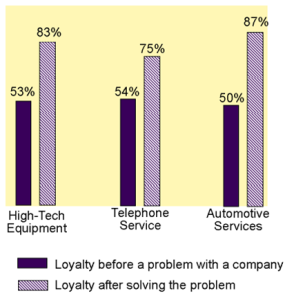 The way to satisfy customers is to meet their expectations and treat them well. However, no organization can achieve 100% customer satisfaction. There will always be some customer dissatisfaction due to a variety of reasons. Hence, it is inevitable that any organization that has customers will get complaints.
The way to satisfy customers is to meet their expectations and treat them well. However, no organization can achieve 100% customer satisfaction. There will always be some customer dissatisfaction due to a variety of reasons. Hence, it is inevitable that any organization that has customers will get complaints.
But are there many dissatisfied customers who complain? Unfortunately, no. Many dissatisfied customers do not complain. And if a customer does not complain and has an issue that is not resolved, they are likely to go to the competition. In other words, most people prefer to show their dissatisfaction by not buying again in the future rather than directly complaining.
The worst part about this is that most times the organization isn’t even aware that there was an issue. The other sad fact is that a dissatisfied customer is more comfortable telling their friends about a bad experience than telling the organization.
As a result, obtaining the constructive thoughts and opinions of a customer is not an easy task. One popular tool that organizations often use is the customer survey questionnaire but it doesn’t offer much useful feedback, as they are considered a chore by most and filled in suitably halfheartedly. A customer complaint, on the other hand, provides an unbiased and frank comment on a flaw in the organization’s product or service, and at no cost.
This is why many forward thinking organizations are not only grateful to receive complaints, but encourage customers to complain and also provide an easy way for them to do so. They appreciate complaints and take them as gifts from customers, and tap into the opportunity that lies therein.
Rather than being the mark of an abject failure, mistakes are a part of human nature and a necessary means for people to learn and to grow. Being created and run by individuals, organizations are no different. If the customer highlights an overpriced, poor, or unreliable service/product, they are not condemning the organization to redundancy, but offering an opportunity for them to learn from their mistake or inexperience.
Organizations that ignore criticism and think they know better will ultimately lose out in the long run.
A complaint is a warning sign and not a customer lost. How an organization deals with complaints is not only vitally important for their development but also critical in gaining customer respect and loyalty.
Research shows that if customers complain and the organization resolves their issues or takes steps to address them, they are more likely to come back to the organization and become long term customers. It also shows that customers whose complaints have been handled well are more likely to become long term customers than those customers who had no issues.
The impact of complaint resolution on customer loyalty is depicted below for some industries.
This research again stresses the importance of good handling of complaints as a way to boost customer satisfaction, loyalty and sales.
A complaint is therefore not only an opportunity for organizations to improve their service but also an opportunity to retain and increase the loyalty of their customers.
In addition, handling complaints is not about a single transaction or a single customer, but it is to do with the loyalty of that customer over the long term and also the possibility of referrals through positive word of mouth.
So how are complaints handled in your organization? … well enough to tap into the opportunities?


